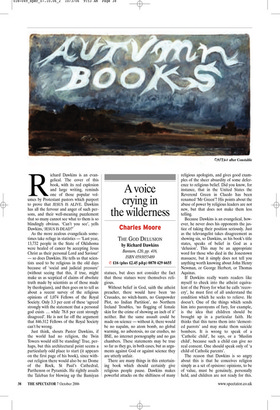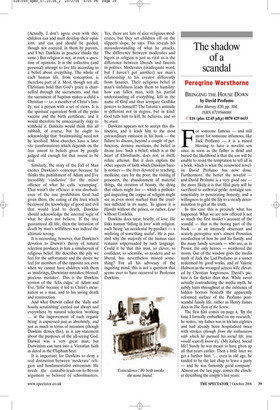A voice crying in the wilderness
Charles Moore
THE GOD DELUSION by Richard Dawkins Bantam, £20, pp. 416, ISBN 0593055489 ✆ £16 (plus £2.45 p&p) 0870 429 6655 Richard Dawkins is an evangelical. The cover of this book, with its red explosion and large writing, reminds one of those popular volumes by Protestant pastors which purport to prove that JESUS IS ALIVE. Dawkins has all the fervour and anger of such persons, and their well-meaning puzzlement that so many cannot see what to them is so blindingly obvious. ‘Can’t you see’, yells Dawkins, ‘JESUS IS DEAD?’ As the more zealous evangelicals sometimes take refuge in statistics — ‘Last year, 13,732 people in the State of Oklahoma were healed of cancer by accepting Jesus Christ as their personal Lord and Saviour’ — so does Dawkins. He tells us that scientists used to be religious in the old days because of ‘social and judicial pressure’ (without seeing that this, if true, might make us as sceptical of claims of absolute truth made by scientists as of those made by theologians), and then goes on to tell us about a recent survey of the religious opinions of 1,074 Fellows of the Royal Society. Only 3.3 per cent of these ‘agreed strongly with the statement that a personal god exists ... while 78.8 per cent strongly disagreed’. He is not far off the argument that 846.312 Fellows of the Royal Society can’t be wrong.
Just think, shouts Pastor Dawkins, if the world had no religion, the Twin Towers would still be standing! True, perhaps, but this architectural point seems a particularly odd place to start (it appears on the first page of his book), since without religion there would also be no Dome of the Rock, St Paul’s Cathedral, Parthenon or Pyramids. He rightly assails the Taleban for blowing up the Bamiyan statues, but does not consider the fact that those statues were themselves religious.
Without belief in God, saith the atheist preacher, there would have been ‘no Crusades, no witch-hunts, no Gunpowder Plot, no Indian Partition’, no Northern Ireland Troubles, ‘no flogging of female skin for the crime of showing an inch of it’ neither. But the same assault could be made on science — without it, there would be no napalm, no atom bomb, no global warming, no asbestosis, no car crashes, no BSE, no internet pornography and no gas chambers. These statements may be true so far as they go, in both cases, but as arguments against God or against science they are utterly unfair.
There are many things in this entertaining book which should certainly give religious people pause. Dawkins makes powerful attacks on the shiftiness of many religious apologists, and gives good examples of the sheer absurdity of some deference to religious belief. Did you know, for instance, that in the United States the Reverend Green in Cluedo has been renamed ‘Mr Green’? His points about the abuse of power by religious leaders are not new, but that does not make them less telling.
Because Dawkins is an evangelical, however, he never does his opponents the justice of taking their position seriously. Just as the televangelist takes disagreement as showing sin, so Dawkins, as his book’s title states, speaks of belief in God as a ‘delusion’. This may be an appropriate word for those who died in the Jonestown massacre, but it simply does not tell you anything worth knowing about John Henry Newman, or George Herbert, or Thomas Aquinas.
If Dawkins really wants readers like myself to check into the atheist equivalent of the Priory for what he calls ‘recovery’, he must first of all understand the condition which he seeks to relieve. He doesn’t. One of the things which sends him into paroxysms of fury, for example, is the idea that children should be brought up in a particular faith. He thinks that this turns them into ‘demented parrots’ and may make them suicide bombers. It is wrong to speak of a ‘Catholic child’, he says, or a ‘Muslim child’, because such a child can give no real consent. One should speak only of ‘a child of Catholic parents’.
The reason that Dawkins is so angry about this is that he conceives religion simply as a set of opinions: opinions, to be of value, must be genuinely, personally held, and children are not ready for this. (Actually, I don’t agree even with this: children can and must develop their opinions, and can and should be guided, though not coerced, in them by parents, and I bet Dawkins in practice thinks the same.) But religion is not, at root, a question of opinions. It is the collective (and personal) attempt to live life according to a belief about everything. The whole of each human life, from conception, is therefore part of it. Most, though not all, Christians hold that God’s grace is channelled through the sacraments, and that the sacrament of baptism makes a child a Christian — i.e. a member of Christ’s family, not a person with a set of views. It is the spiritual equivalent both of the polio vaccine and the birth certificate, and it would therefore be unnecessarily risky to withhold it. Dawkins would think this all rubbish, of course, but he ought to acknowledge that ‘brainwashing’ need not be involved. Most churches have a later rite (confirmation) which depends on the free assent to beliefs given by people judged old enough for that assent to be real.
Similarly, the story of the Fall of Man excites Dawkins’s contempt because he thinks the punishment of Adam and Eve incredibly ‘vindictive’ for the minor offence of what he calls ‘scrumping’. That wasn’t the offence: it was disobedience of the one prohibition God had given them, the eating of the fruit which bestowed the knowledge of good and evil that would lead to death. Dawkins should acknowledge the internal logic of what he does not believe. If the tree guaranteed all life, then the intrusion of death by man’s wilfulness was indeed the ultimate wrong.
It is interesting, however, that Dawkins’s devotion to Darwin’s theory of natural selection produces in him a simulacrum of religious belief. He describes the pity we feel for the unfortunate and the desire we feel for members of the opposite sex even when we cannot have children with them as ‘misfirings, Darwinian mistakes: blessed, precious mistakes’. This is the Dawkins version of the ‘felix culpa’ of Adam and Eve, ‘felix’ because it led to Christ’s incarnation as a man, and to his saving death and resurrection.
And what Darwin called the ‘daily and hourly scrutinising’ carried out always and everywhere by natural selection ‘working ... at the improvement of each organic being’ is expressed just as absolutely, and just as much in terms of intention (though Dawkins denies this), as is any statement about the purposes of the all-seeing God. Darwin was a very great man, but Darwinism can turn into a Victorian faith as dated as the Clapham Sect.
It is important for Dawkins to deny a real distinction between ‘moderate’ religion and fundamentalist extremism. He needs the cannabis-leads-on-to-heroin argument so beloved of schoolmasters. Yes, there are lots of nice religious moderates, but they set children off on the slippery slope, he says. This reveals his misunderstanding of what he attacks. The difference between moderates and bigots in religion is just as vital as is the difference between liberals and fascists in politics. Moderates (inadequate word, but I haven’t got another) see man’s relationship to his creator differently from fanatics. Their religious belief in man’s sinfulness leads them to humility: how can fallen man, with his partial understanding of everything, kill in the name of God and thus arrogate Godlike powers to himself? The fanatic’s attitude is different not in degree, but in kind: God tells him to kill, he believes, and so he must.
Dawkins appears not to accept this distinction, and it leads him to the most extraordinary omission in his book — the failure to discuss, beyond a couple of perfunctory, derisive mentions, the belief in divine love. Such a belief, which is at the heart of Christianity, does not, in itself, refute atheism. But it does explain the other aspects of faith which Dawkins barely notices — the lives devoted to teaching, medicine, care for the poor, the visiting of prisoners, the abandonment of material things, the creation of beauty, the dying that others might live — which a pathologist inspecting the corpse of religion might see as even more marked than the cruelties inflicted in its name. To ignore it is Hamlet without the prince, or rather, Lear without Cordelia.
Dawkins does treat, briefly, of love. He links human ‘falling in love’ with religion, each being ‘an accidental by-product — a misfiring of something useful’. He is puzzled why the majority of the human race remains unpersuaded by such language. Could it be that this man, so clever, so confident, so scientific, so modern and so liberal, has nevertheless missed something? For all his advocacy of the inquiring mind, this is not a question that seems ever to have occurred to Professor Dawkins.



















































































 Previous page
Previous page